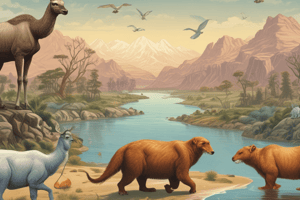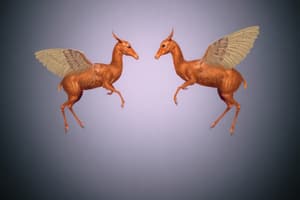Podcast
Questions and Answers
_________ cycles are the periodic changes that occur in an organism's body to prepare for reproduction.
_________ cycles are the periodic changes that occur in an organism's body to prepare for reproduction.
Reproductive
The primary components of the female reproductive system are the ovaries, uterus, fallopian tubes, and _______.
The primary components of the female reproductive system are the ovaries, uterus, fallopian tubes, and _______.
vagina
The male reproductive system has three main organs: testes, epididymis, and _______.
The male reproductive system has three main organs: testes, epididymis, and _______.
vas deferens
Reproduction is the process that ensures the survival of species by producing new offspring through asexual and _______ reproduction.
Reproduction is the process that ensures the survival of species by producing new offspring through asexual and _______ reproduction.
Ovaries produce eggs (ova) and secrete hormones such as estrogen and _______.
Ovaries produce eggs (ova) and secrete hormones such as estrogen and _______.
Asexual reproduction is a type of reproduction in which new individuals are produced from a single parent without the contribution of ______
Asexual reproduction is a type of reproduction in which new individuals are produced from a single parent without the contribution of ______
Examples of asexual reproduction in animals include budding (e.g., sea stars), fragmentation (e.g., flatworms), and ______ (e.g., some insects)
Examples of asexual reproduction in animals include budding (e.g., sea stars), fragmentation (e.g., flatworms), and ______ (e.g., some insects)
Sexual reproduction occurs when two ______ (sperm and eggs) from two genetically distinct organisms fuse to form a new individual
Sexual reproduction occurs when two ______ (sperm and eggs) from two genetically distinct organisms fuse to form a new individual
The process of sexual reproduction involves several stages, including gamete production, fertilization, and early embryonic ______
The process of sexual reproduction involves several stages, including gamete production, fertilization, and early embryonic ______
Animal reproduction is a complex and fascinating process that ensures the survival of ______
Animal reproduction is a complex and fascinating process that ensures the survival of ______
Flashcards are hidden until you start studying
Study Notes
Exploring Animal Reproduction: A Guide to Class 8 Science Chapter 9
Reproduction is the process that ensures the survival of species by producing new offspring. In Chapter 9 of Class 8 Science, we dive into the fascinating world of animal reproduction, featuring topics such as reproductive cycles, the female reproductive system, the male reproductive system, asexual reproduction, and sexual reproduction.
Reproductive Cycles
Reproductive cycles are the periodic changes that occur in an organism's body to prepare for reproduction. These cycles are part of a larger process called the reproductive strategy, which helps ensure that organisms reproduce when environmental conditions are favorable. Reproductive cycles vary between species and can be seasonal or continuous.
Female Reproductive System
The primary components of the female reproductive system are the ovaries, uterus, fallopian tubes, and vagina. Ovaries produce eggs (ova) and secrete hormones such as estrogen and progesterone. The uterus is the site of fertilization and embryonic development. Fallopian tubes are responsible for transporting eggs from the ovaries to the uterus, while the vagina is the reproductive tract's opening.
Male Reproductive System
The male reproductive system has three main organs: testes, epididymis, and vas deferens. Testes produce sperm and testosterone, the epididymis stores and matures sperm, and the vas deferens transports sperm to the urethra during ejaculation.
Asexual Reproduction
Asexual reproduction is a type of reproduction in which new individuals are produced from a single parent without the contribution of gametes (sperm or eggs). Examples of asexual reproduction in animals include budding (e.g., sea stars), fragmentation (e.g., flatworms), and parthenogenesis (e.g., some insects).
Sexual Reproduction
Sexual reproduction occurs when two gametes (sperm and eggs) from two genetically distinct organisms fuse to form a new individual. The process of sexual reproduction involves several stages, including gamete production, fertilization, and early embryonic development.
In summary, animal reproduction is a complex and fascinating process that ensures the survival of species. This chapter of Class 8 Science explores the reproductive cycles, male and female reproductive systems, asexual and sexual reproduction, and their importance in the broader context of biology and ecology.
Studying That Suits You
Use AI to generate personalized quizzes and flashcards to suit your learning preferences.




